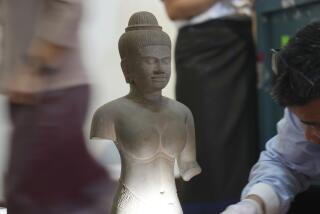Russia Ends Dispute, Lets Art Exhibit Go to Houston
- Share via
WASHINGTON — Ending a peculiar three-week standoff, the Russian government agreed Friday to allow a $100-million collection of czarist jewels and artwork to head for Houston where it will resume an American museum tour.
Timothy Dickinson, an attorney for the Russian government, disclosed the agreement during a press conference at the Russian Embassy, where much of the collection has been impounded. He would not provide details except to say the parties agreed on an “equitable splitting of the revenues.”
Former Rep. James Symington (D-Mo.), president of the American Russian Cultural Cooperation Foundation, which is sponsoring the two-year tour, called the dispute “a bizarre moment in the exhibit’s history.”
Symington’s organization paid the Russian government $400,000 for rights to exhibit the jewels and other treasures from three centuries of Russian czars. But after the exhibit played to large and appreciative crowds in Washington for 10 weeks, President Boris N. Yeltsin’s government asked for it to be returned for display during ceremonies marking the 850th anniversary of Moscow.
For a week after the exhibit ended its Washington run April 13, two automobiles from the Russian Embassy--displaying their red, white and blue diplomatic license plates--blocked a moving van containing most of the treasures. Then the truck was moved to the Embassy compound, where it stayed as the controversy simmered for two more weeks.
The exhibit will open in Houston May 11. Dickinson said that no decision has been made yet about whether the artifacts will be shown at later dates in Memphis, Tenn., and San Diego.
The Clinton administration insisted that the U.S. government had no stake in the dispute between Russia and the foundation. But a foundation spokesman said the State Department persuaded Andy Somers, a former executive of American Express who is now a businessman in Russia, to negotiate on behalf of the foundation.
“He thought he would be here for one day but he has been at the negotiating table since last Saturday,” Brian Gaudet of the foundation said.
More to Read
Sign up for Essential California
The most important California stories and recommendations in your inbox every morning.
You may occasionally receive promotional content from the Los Angeles Times.










